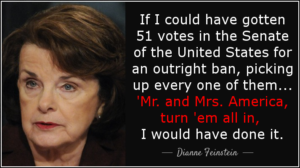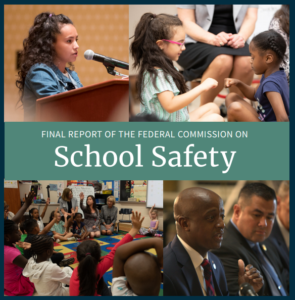NSSF Applauds U.S. House of Representatives Introduction of Freedom Financing Act
Legislation Protects Firearms Industry from Corporate Discrimination
 The National Shooting Sports Foundation (NSSF), the firearms industry trade association, applauded the introduction of H.R. 2079, the Freedom Financing Act in the U.S. House of Representatives by Congressman Roger Williams (R-Texas). The legislation would ensure large financial institutions cannot deny service to certain constitutionally-protected industries that are fully compliant with all laws and statutes.
The National Shooting Sports Foundation (NSSF), the firearms industry trade association, applauded the introduction of H.R. 2079, the Freedom Financing Act in the U.S. House of Representatives by Congressman Roger Williams (R-Texas). The legislation would ensure large financial institutions cannot deny service to certain constitutionally-protected industries that are fully compliant with all laws and statutes.
“Americans must be reassured their tax dollars aren’t weaponized by corporate institutions attempting to eliminate a lawful industry that has become politically-disfavored by boardroom bureaucrats,” said Lawrence G. Keane, Senior Vice President and General Counsel for the National Shooting Sports Foundation. “Congressman Williams’s leadership is crucial to ensure banks which have enjoyed bailouts and insurance programs funded by taxpayers aren’t allowed to benefit from these protections while purposefully discriminating against the industry that provides the means for Second Amendment rights. These policies are debated and created by the elected officials Americans vote to represent their interests, not by faceless corporate boards representing the interest of the few. We applaud Congressman Williams for his clear vision in correcting this abuse of American trust and taxpayer dollars.”
The Freedom Financing Act focuses on the most egregious examples of legal commerce being banned through corporate policy that target firearms manufacturers, distributors, importers and retailers. Because the intent is not to force financial institutions to do business with certain industries – but rather to ensure that legal commerce is not prohibited – this legislation exempts financial institutions with less than $10 billion in assets.
The firearms industry has opposed moves by Bank of America, Citigroup and JPMorgan Chase when they published policies to deny financial services to AR-15 manufacturers and retailers to adopt restrictive sales policies, products that are legal under federal law for ownership and commonly-owned, with more than 16 million modern sporting rifles in private ownership today. Public policy is the responsibility of elected leaders and not dictated by a select few of unaccountable corporate boardroom bureaucrats. Policies to discriminate a lawful industry are a threat to American’s ability to choose the firearms that best meet their needs for self-defense, hunting and recreational target shooting.
NSSF Praises U.S. House Bipartisan Target Practice and Marksmanship Training Support Act
Legislation Frees Funds for State Range Construction
 The National Shooting Sports Foundation® (NSSF®), the firearms industry trade association, praised the introduction of H.R. 1222, the Target Practice and Marksmanship Training Support Act of 2019 in the U.S House of Representatives. The bipartisan bill was authored by Reps. Ron Kind (D-Wis.) and Rob Bishop (R-Utah).
The National Shooting Sports Foundation® (NSSF®), the firearms industry trade association, praised the introduction of H.R. 1222, the Target Practice and Marksmanship Training Support Act of 2019 in the U.S House of Representatives. The bipartisan bill was authored by Reps. Ron Kind (D-Wis.) and Rob Bishop (R-Utah).
“This is crucial legislation that would provide state fish and game agencies more flexibility to use Pittman-Robertson excise taxes dollars raised from the sale of firearms and ammunition to enhance existing public shooting ranges and to build new ones to meet the growing need for additional places for target shooters to participate in their sport,” said Lawrence G. Keane, NSSF Senior Vice President and General Counsel. “Public shooting ranges provide hunters a place to sight in rifles and shotguns before hunting seasons, for people to take firearm safety and hunter education courses and, for recreational target shooters to enjoy their sport. NSSF thanks Congressmen Kind and Bishop for recognizing the critical need and providing solutions to benefit recreational shooters and conservation.”
This legislation has been introduced in previous Congressional sessions, where it received overwhelming bipartisan support, but was never advanced to the president. The funds are derived from an existing excise taxes paid by firearms and ammunition manufacturers since 1937, with almost $12.1 billion raised for wildlife conservation supported by the sale of these products.
States are permitted to use some of those funds for hunter education courses and for public shooting ranges under a restrictive formula that has largely discouraged state agencies from building and enhancing public shooting ranges. The legislation would provide states greater flexibility on their ability to use Pittman-Robertson excise tax funds by increasing the cap of federal funds accrued for the creation and maintenance of shooting ranges from 75 to 90 percent. This means states could begin work on range facilities with 10 percent matching funds, instead of the current 25 percent. It would also enable excise funds to be made available and accrue for five years for land acquisition or range construction.
Target shooters are largely responsible for the funds derived through excise taxes from the sale of firearms and ammunition products. That money is directly responsible for habitat conservation, recreational shooting and wildlife management, making gun owners, hunters and manufacturers largest financial supporters of wildlife conservation throughout the United States. The development of new ranges will help encourage participation in hunting and the shooting sports, ensuring wildlife conservation funding through the Pittman-Robertson Act will continue for generations to come.
Senate Democrats Waste No Time Attacking Second Amendment Rights
Feinstein & Co. Introduce “Assault Weapons” Ban for 2019
 Just a week into the 116th United States Congress a swarm of angry, misinformed democrat politicians have introduced legislation that would ban the sale, manufacture, and importation of hundreds of firearms by name and potentially thousands more based on largely cosmetic characteristics as well as putting the kibosh on any magazines capable of holding more than 10 rounds.
Just a week into the 116th United States Congress a swarm of angry, misinformed democrat politicians have introduced legislation that would ban the sale, manufacture, and importation of hundreds of firearms by name and potentially thousands more based on largely cosmetic characteristics as well as putting the kibosh on any magazines capable of holding more than 10 rounds.
Dubbed the Assault Weapons Ban of 2019, the official title of S.66 is A bill to regulate assault weapons, to ensure that the right to keep and bear arms is not unlimited, and for other purposes. Seriously? “To ensure that the right to keep and bear arms is not unlimited?” This from the people who swore an oath to uphold and defend a document that explicitly reads “the right of the people to keep and bear Arms, shall not be infringed.” Try this on for size: infringe (verb): Act so as to limit or undermine (something); encroach on. Continue reading
Legal Challenges to Bump Stock Ban Begin Rolling In
 As reported Tuesday and discussed on the GunLink Forums, the Department of Justice this week issued a new regulation reversing the BATFE’s longstanding position on bump stock devices. This regulation modifies the meaning of certain words and changes the codified definition of machine gun such that it now includes language inclusive of bump stocks.
As reported Tuesday and discussed on the GunLink Forums, the Department of Justice this week issued a new regulation reversing the BATFE’s longstanding position on bump stock devices. This regulation modifies the meaning of certain words and changes the codified definition of machine gun such that it now includes language inclusive of bump stocks.
This reclassification leads to a situation faced by many hundreds of thousands of owners of such devices whereby they must now either destroy or surrender to the BATFE their lawfully purchased property or become overnight felons in possession of illegal, unregistered machine guns.
No doubt worse than the fact that they must now hand over their property – purchased in good faith with assurance from the BATFE that the device was, in fact, not a machine gun – without compensation, is the manner in which the regulation came about.
To be certain, the regulation is causing an uproar among factions of the firearms community with talk about violations of everything from Article I of the US Constitution’s prohibition on ex post facto laws to various and sundry elements of the Bill of Rights to include the 2nd, 4th, 5th, 9th, and 10th Amendments.
The Cato Institute published a piece rightly stating that “this regulation is not an attempt to clarify a vague law, but to seize political expediency to expand the power of the executive,” continuing that they may reserve their “right to intervene in the coming litigation.”
It should come as no surprise that the first legal challenges to the Bump Stock Ban were put into motion just a few short hours after the announcement that it had been inked by Acting Attorney General Matthew Whitaker given that the opening shots in this legal battle were fired by some of the more prolific opposition to the change since its early stages. Continue reading
GOA, NRA Offer Differing Views on Trump Admin’s School Safety Report
 The White House yesterday announced the final report by the administration’s Federal Commission on School Safety. The full report can be read here.
The White House yesterday announced the final report by the administration’s Federal Commission on School Safety. The full report can be read here.
Calling it a “comprehensive approach to making sure school campuses are safe places,” the commission offered a number of suggestions, including identification and treatment of mental issues, calling on media outlets to stop using names and photos of prolific attackers, and implementation of training, planning, and potentially placing armed staff.
However, the report is drawing mixed responses from pro-gun groups thanks to one contentious point: the recommendation for “extreme risk protection orders” (ERPOs), which the document describes as “also known as gun violence protection orders, risk warrants, or red flag laws, these state laws provide law enforcement (and in some instances, family members) with a legal, temporary way to prevent individuals who pose a threat to themselves or others from possessing or purchasing firearms.” So… basically firearm confiscation and removal of Second Amendment rights without due process.
In a Tuesday statement, NRA-ILA executive director Chris W. Cox highlighted some pet issues, saying “The National Rifle Association applauds the [report]. The report includes a number of recommendations for which the NRA has been advocating for years, including reforming our mental health laws, strengthening school security, and addressing an increasingly violent culture. It also calls on the media to stop reporting the names and photos of mass murderers, which only encourages copycat behavior.“
Despite the fact that existing law – specifically, 18 U.S.C. § 922(g) – already “makes it unlawful for [any person 2ho has been adjudicated as a mental defective or has been committed to any mental institution] to ship, transport, receive, or possess firearms or ammunition“, Cox continued to praise the ERPO language of the report. Cox continued, “Finally, we appreciate President Trump’s support for keeping firearms out of the hands of those who have been adjudicated by a court to be a danger to themselves or others in the form of state Extreme Risk Protection Orders — provided they include strong due process protections, require mental health treatment, and include penalties against those who file frivolous charges to harass law-abiding citizens.“
Sorry, Chris – that mechanism for keeping firearms out of those people’s hands, and the due process protections, are already in existing law and, on their face, appear to be precisely the opposite of what ERPOs achieve.
Gun Owners of America’s (GOA) executive director, Erich Pratt responded with a decidedly different take, calling it a continuation of the President’s “take the guns first, due process later rhetoric,” referencing the case of 61-year old Maryland resident Gary Willis, who was killed while officers were executing firearm confiscation orders. According to Breitbart, the details behind the issuance of the confiscation order against Willis were not reported; all that was known was that a niece said one of her aunts requested the order.
Pratt continued, “Instead of resorting to the ‘Minority Report’ style gun control preferred by Michael Bloomberg and Chuck Schumer, President Trump should encourage initiatives like Concealed Carry Reciprocity, repealing gun-free zones and arming teachers — all measures he has vocally supported in the past,” concluding “These Gun Confiscation Orders are a violation of Second, Fourth and Fifth Amendment rights, and GOA will continue to stand for the Bill of Rights and oppose these dangerous initiatives.“
Dianne Feinstein Statement on Bump Stock Ban

In absurd reaction to ludicrous regulation, California Democratic Senator Dianne Feinstein issued the following statement regarding the administration’s new ban which declares the accessory to be a “machine gun.”
For readers not familiar with bump stocks, the device is a firearm accessory – a shoulder stock that is loose fitting enough to allow a rifle equipped with one about half an inch of front-to-rear play. When used as intended, the user pulls forward on the firearm (while the stock stays rearward) – pulling the trigger into the shooter’s finger causing it to fire. The recoil impulse of the round going off causes the rifle to move rearward, resetting the trigger. Subsequent, or continued, forward pulls on the firearm repeat the process, allowing for rapid fire as the trigger is quickly pulled multiple times, once for each shot, in fast semi-auto fire. Oh, the humanity… pulling the trigger quickly!
Below is Senator Feinstein’s hand-wringing statement:
“Bump stocks allow semi-automatic weapons to fire like automatic weapons, making guns like the AR-15 even more deadly. Banning bump stocks has widespread support and it’s encouraging to see the Trump administration take action on this commonsense gun safety proposal.
“However, Congress must pass legislation to ensure a ban on bump stocks and other similar devices is protected from legal challenges.
“Until March 2018, ATF maintained that bump stocks could not be banned through administrative action. Legislation is necessary to ensure a ban is implemented and regulations are not tied up in court.
“Gun Owners of America has already announced its intent to sue to block the ban from taking effect. Congress simply must act to get these dangerous devices off the streets, and I will be reintroducing my bill to ban them early next year.”








